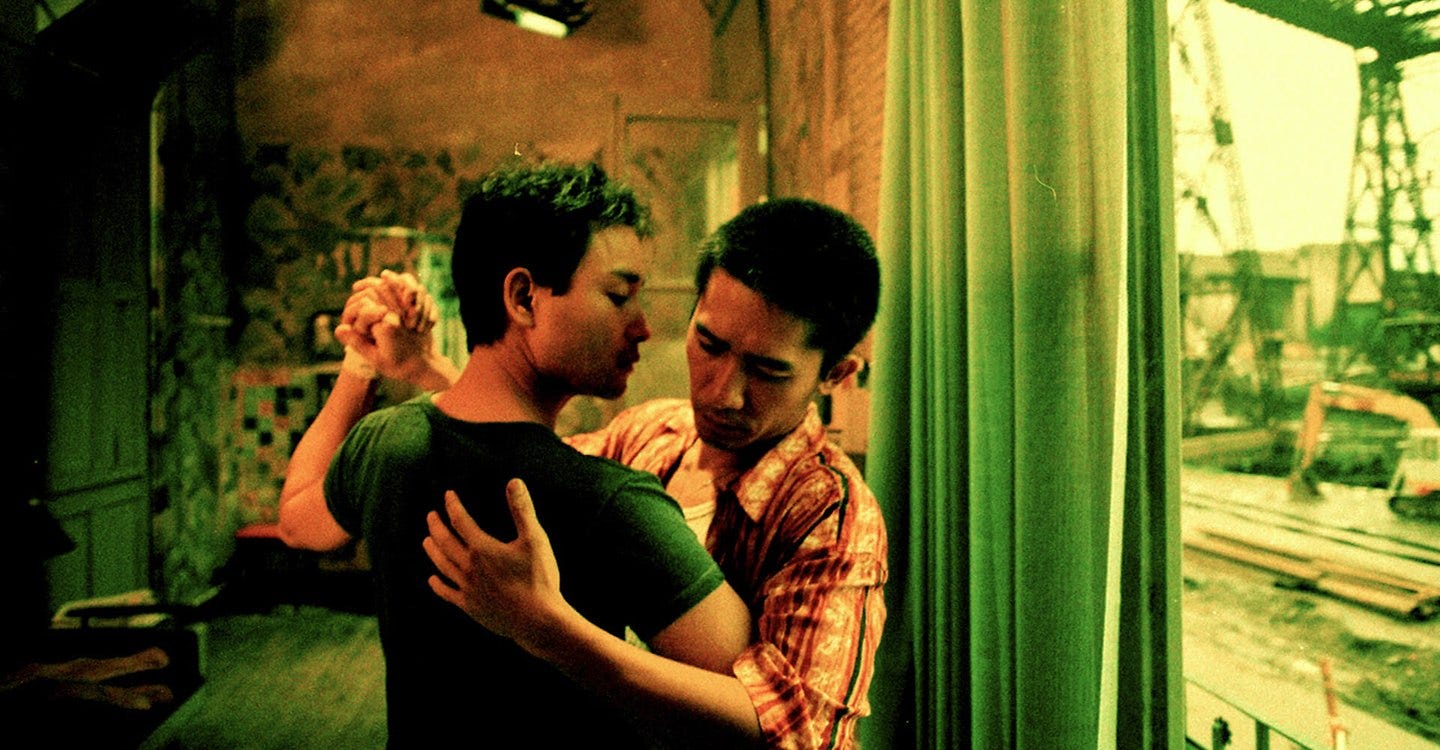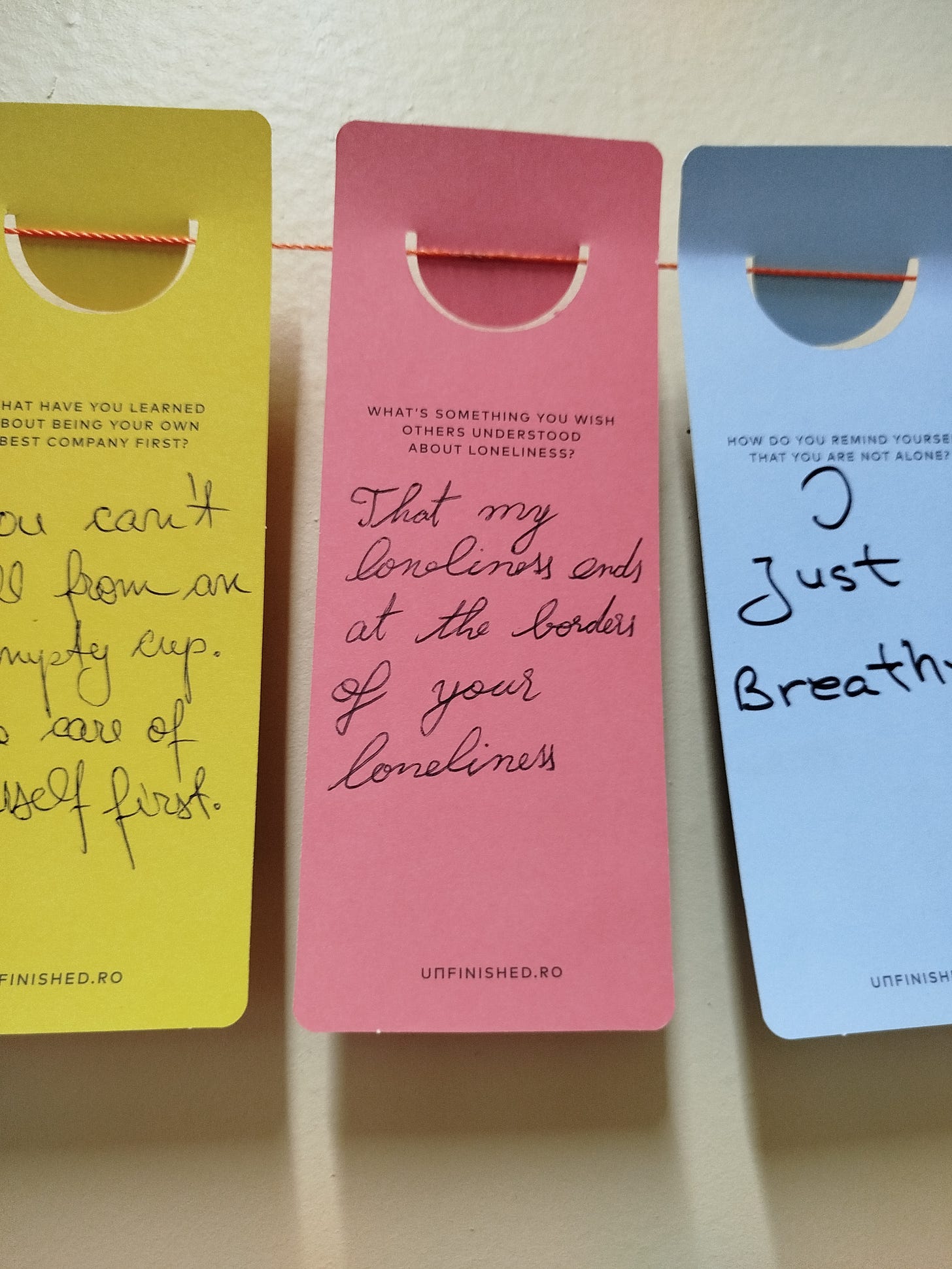The Act of Separation is an Act of Love
How Letting Go Can Reveal What Truly Holds Us Together
When do you know you need to end a relationship? How do you decide when’s the right time, if there’s one? Can there be a way to untangle it without breaking, a parting of ways without violence, and instead, with care and love? How often do we stay—because we fear being alone, and lonely?
I recently separated from my romantic relationship, and have been reflecting on how endings, too, play an important role in how we connect and cultivate meaningful relationships. Not only when it comes to life partners we choose, but even beyond. Sometimes it’s friendships we need to let go of, or leaving work relationships, or family members.
Love comes in all different shapes and forms—and if you feel intrigued to explore love—romantic & beyond in next week’s Oneliness Circle, join us on Thursday, February 27: Sign up here 💛 (free / optional donation).
Ending relationships is rarely without pain, but sometimes it is the only act of love left to give for ourselves and the other. Individual circumstances and contexts vary with every relationship, but the process is almost always messy. The decision to separate can stem from conflict, suffering, and betrayal—trust that’s been breached, promises broken, or respect violated in ways that are no longer repairable.
And so, we choose to leave, to leave behind, and pour love into ourselves as we heal. Sometimes a breakup involves breaking—an emotional rupture that leaves both sides in a cold war state, with no possibility of reconciliation. In other relationships and cultures, though, separating or divorcing can feel unimaginable, especially for women who may face severe cultural stigma or social exclusion. Women in many parts of the world, as recent studies from UN Women highlight, are often caught in relationships where leaving isn’t just difficult—it’s nearly impossible due to entrenched social norms and lack of rights.
In the culture I grew up in, endings and separations are often marked by a sense of failure. The implicit understanding is that at least one part must have done something wrong, irredeemable—something that’s endangered the ideal we hold for relationships, especially romantic ones. The fairytale ending still lingers, despite efforts toward liberation and a broader understanding of what relationships can be. Because, despite all these progressive concepts, we, as humans, individually and collectively, still long to be loved and cared for by someone who truly sees us.
To love beyond yourself and the ideal you might uphold for a romantic relationship might include, too, to leave and separate.
Even, and especially if loneliness might come with it.
One of the most existential fears that binds us is the fear of being, ending up, and dying alone and lonely. When searching for writing around this topic, I often come across countless pieces titled "How to cope with loneliness after a breakup." It seems almost as if the opposite of loneliness is the promise of being in love, of finding the one.
Yet, everyone who’s been in an intimate relationship knows that loneliness doesn’t fade once you’re with someone. Research has shown that 20% of wives and 24% of husbands report feeling significantly lonely, and as loneliness increases in marriage or intimate relationships, so too does the risk of depression. Loneliness within a marriage can be especially distressing because it contradicts societal expectations of what a marriage should be, often leading to a profound impact on one’s physical, emotional, and spiritual well-being.
The most brutal kind of loneliness I’ve experienced is the ache of being with someone, yet feeling unseen by them. The longing for a kind of connection that’s right there but just out of reach. The grieving of tenderness and intimacy that is no longer there—or worse, sometimes is, and sometimes isn’t.
So, instead of leaving, of separating, of losing, and facing aloneness—and more loneliness—the option remains to stay, to endure, to wait it out. We cling to the hope that something might eventually change, that circumstances will help along the way, and that this is merely a phase. Sometimes, that’s true. If both or all parties commit, reconciliation and ways to reconnect can be found and cultivated.
But sometimes, to separate is precisely the act of love that’s needed.

An act of love towards yourself and your own needs, that might not be met by the other. In The Second Sex, Simone de Beauvoir speaks to the complexity of relationships, especially the roles that dependency and autonomy play within them. She argues that freedom, including the freedom to end relationships, is essential to our growth as individuals. Choosing to leave, even in the face of loneliness, is an act of claiming autonomy—an acknowledgment that self-love is as important as love for another.
Through the teachings of Zen Buddhist monk Thich Nhat Hanh and the Plum Village community, the notion of "mindful separation" invites us to approach endings with grace, acceptance, and compassion. They teach that suffering is not something to avoid or push away, but rather something to face with mindfulness and awareness. In his perspective, when relationships end, there is an opportunity for both individuals to practice “conscious uncoupling”—a term that, while popularized in recent years, has roots in Buddhist teachings about detachment and compassion. In Plum Village, there is an emphasis on embracing the impermanence of all things, including relationships, and seeing them not as failures but as part of a larger, ongoing process of transformation.
Non-Western rituals, like those practiced in the Buddhist tradition or in Indigenous communities, can offer a different way to understand separations. For instance, many Native American traditions include rituals of mourning and letting go that emphasize releasing the past with love and gratitude, instead of regret or anger. Such rituals hold space for grief while simultaneously fostering a sense of renewal and connection to the larger web of life.
When we allow ourselves to separate mindfully, we engage in a process that honors what was and simultaneously makes space for what may come—whether it is aloneness, new relationships, or simply the quiet joy of reconnecting with ourselves. Ending a relationship doesn't have to be seen as a rupture; it can be a compassionate act of allowing both people to grow, even if that growth happens separately.
As I’m taking time to process my most recent separation, I’m reflecting on how, whether in the context of romantic relationships, friendships, or life itself—we must remember that in each of them, there is room for tenderness, for letting go without the violence that our language of “breaking up,” cutting ties, going no contact,” or even "losing touch" often suggests.
Separation is a natural part of life. And learning to accept that is part of how we grow into more complete, more loving versions of ourselves.
Even if, and especially when, loneliness accompanies it.
Thank you for reading! As always, feel free to share and comment.💛
The Oneliness Project is rooted in the belief that loneliness is both a personal and societal experience, we explore what it means to foster care, build meaningful relationships, and nurture a sense of interconnectedness—oneliness.
Join the community to exchange and share with others, take part in our monthly Oneliness Circles or upcoming learning programs, or inquire about custom talks and workshops or 1:1 mentoring.
Plus: listen to the first editions of 🎙️ The Oneliness Voices, a new collective audio storytelling project to humanize loneliness through the power of stories!



I loved this piece—so many insights packed into just a few pages. Enlightening, heartwarming, and fun.
Endings are important, but as you mentioned, they can be difficult for all the reasons you highlighted and more. In societies where expectations dictate that relationships must endure—even when they no longer work—people often stay, bound by shame or fear of disgracing their families, even when both parties wish to move on.
And yet, endings matter. When something no longer works, letting go can be the only way forward—for oneself and the other. It allows both to reflect, heal, and move toward whatever kind of relationship or life they choose to create.
In a world full of “versus”, seeing someone who encourages dialogue, collaboration and togetherness feels liberating. Even, or especially, when it comes to letting go. Thank you, Monika! 🤗